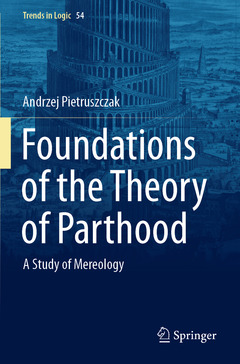Foundations of the Theory of Parthood, 1st ed. 2020 A Study of Mereology Trends in Logic Series, Vol. 54

The book is the first systematic study of weak systems of mereology by which I understand various systems being essentially weaker than the original theory of Leśniewski’s mereology. The two main achievements of the book are:
1. Construction of systems of mereology with weak sum existence axioms in place of the original Leśniewski’s axiom according to which every non-empty collection of objects has its sum.
2. Construction of a non-standard system without the transitivity axiom, second discussed axiom to the sum existence.In Chapter I (Introduction) I present the motivation for development of the theories presented in the sequel and analyze to the core topics of mereology: non-existence of the zero element (roughly speaking – non-existence of a counterpart of the set-theoretical empty set), the notion of class and set of Leśniewski’s which gave rise to mereology. I also explain what
Chapter II. Theories of parthood without sum existence axioms treats about those system which does not have any mereological sum existence postulate. This part of the book establishes universal properties of transitive parthood which remain valid for all theories presented further – the properties of auxiliary relations of proper part, overlapping, proper overlapping and being exterior to are introduced and examined. I formulate various principles of extensionality for the aforementioned relations and analyze different theories with the principles adopted as axioms. In this chapter I introduce and examine supplementation principles and the notions of mereological sum and mereological fusion, which are the central concepts of mereology. I show what facts can be established about theses without using any existential axioms involving either sum or fusion. Moreover, the mutual dependencies between mereological sets and the standard supremum relation are studied. Finally, having defined the notion of theory, I sketch the landscape of non-existential mereologies by establishing suitable dependencies among them (and building a suitable lattice of theories).
Chapter III. Theories of parthood with sum existence axioms is devoted to the systems of axioms of mereology enriched with various sum existence postulates. The common factor of all theories within the chapter is thestrong supplementation principle (plus standard order axioms put upon parthood). I begin with the theory known in the literature under the name of Simons’ minimal extensional mereology, which is a theory obtained by introducing an axiom of existence of restricted operation of mereological product. Its extensions with other “natural” axioms (like existence of suprema and sums) are also analyzed in detail. Further I carry out an exhaustive examination of the so called super-supplementation principles, whose importance stems from the fact that they allow for definition of mereological difference (or relative complement) in the absence of the unity of a given structure. The most substantial contribution to the field of mereology in the chapter seems to be the exposition of Grzegorczyk mereology, the theory outlined by the Polish logician in the 50’s of the twentieth century but firstly so thoroughly analyzed in my book. The importance of this theory is hidden in its fruitful applications beyond pure mereology, for example in point-free topology based on connection structures. Again, theories with various axioms are compared relative to their strength and suitable dependencies are established. The chapter is concluded with exposition of mereology with the strongest possible sum existence axiom and presentation of finite structures.
Chapter IV. Theories of parthood without transitivity contains exposition of the mereological theory which, to my knowledge, is the first one from which the transitivity of parthood is abandoned. Instead I introduce the notion of local transitivity and show that in structures determined by quite natural axioms one can still define and speak about the central notion of mereology, i.e., mereological sum. The core of the theory is non-existential, in the sense that we can speak about locally transitive axioms without axioms postulating existence of mereological sums. Yet we still can, after having defined sums, enrich the theory with counterparts of existential axioms for transitive theories. In this sense, among others, the theory from this chapter can be considered as a generalization of theories with transitivity or, to put it briefly, general mereology.
The book is concluded with two appendices devoted to, respectively, logic and set theory, and algebra. In the latter we described the so-called Grzegorczyk lattices, which are very helpful with understanding his systems of mereology.Is the first book to systematically study the weak systems of mereology
Presents a critical analysis on topics related to mereology
Constructs systems of mereology with weak sum existence axioms
Discusses a non-standard system of mereology without the transitivity axiom
Date de parution : 02-2021
Ouvrage de 285 p.
15.5x23.5 cm
Date de parution : 02-2020
Ouvrage de 285 p.
15.5x23.5 cm
Thème de Foundations of the Theory of Parthood :
Mots-clés :
Mereology; Foundations of Mereology; Weak Systems of Mereology; Transitivity of Parthood; Mereological Sum Existence Axioms; Existentially neutral theories of parthood; mereological sum; mereological fusion; Leśniewski mereology; Grzegorczyk mereology; Lesniewski mereology; Non-transitive theories of parthood; Bounded axioms of mereological sum; Supplementation principles in mereology; Mereology and Boolean algebras; Grzegorczyk lattices
